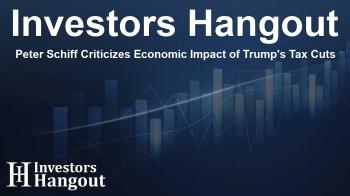Peter Schiff Criticizes Economic Impact of Trump's Tax Cuts

Economic Insights from Peter Schiff
Economist and market commentator Peter Schiff is sounding the alarm regarding President Donald Trump's recent tax and spending initiatives, suggesting that they may not benefit the U.S. economy as intended. Many experts agree that such financial strategies could lead to adverse outcomes, particularly surrounding inflation and budget deficits.
Concerns Over Economic Growth
In a recent statement, Schiff articulated his skepticism about Trump's tax cuts, arguing that they contribute to greater budget deficits without fostering genuine economic growth. He emphasizes that real economic improvement stems from policies that enhance supply rather than simply driving demand. He believes effective tax cuts should lead to increased savings and investment, not just spur consumer spending.
Schiff's Take on Consumer Behavior
Addressing a debate on social media, Schiff responded to the notion that consumer spending is the main driver of economic strength, countering that without a productive economy, spending has little foundation. His comments reflect a widely-held view among economists that a sustainable economy relies more on policy-driven supply-side growth rather than merely consumer expenditure.
Increasing Deficit Concerns
The Congressional Budget Office (CBO) has projected that Trump's new legislation could inflate the deficit by approximately $3.3 trillion over the next decade. Some economists highlight that this expansion adds to an existing trend of increasing national debt, and there are fears that the consequences could be severe for the economy.
Potential Risks of Increased Debt
Experts, including Kent Smetters from the University of Pennsylvania, underline the precarious nature of this financial path. They compare it to fueling a fire with kerosene rather than extinguishing it, indicating a substantial risk to economic stability. This analogy underscores the critical need for carefully measured fiscal policies.
Impact on Health Coverage
Beyond deficit implications, the proposed bill also includes significant cuts to essential services like Medicaid and food assistance. Estimates suggest that up to 11.8 million Americans could lose their health coverage if these cuts materialize, raising ethical and social concerns about the implications for vulnerable populations.
Industry Response
Liz Shuler, the President of the AFL-CIO, has publicly condemned the legislation, dubbing it a potentially catastrophic mistake that disproportionately favors the wealthy while undermining support systems for working families. Shuler’s comments signal widespread discontent among labor organizations regarding the prioritization of tax cuts over social welfare.
Trump’s Optimism Versus Economic Skepticism
In contrast to the criticism, President Trump maintains a positive outlook, claiming that the legislation will unlock a period of unprecedented economic growth and prosperity. He argues that improvements in tariff revenues and economic expansion will compensate for budgetary shortfalls created by the new tax cuts.
Concerns About Future Economic Stability
Despite Trump’s assertions, others remain skeptical. Economists fear that failure to control the impending debt crisis could necessitate severe measures, such as cuts to federal benefit programs like Social Security and Medicaid or significant tax hikes. Such actions, they argue, would adversely affect the standard of living for millions of Americans.
Final Thoughts
As the economic landscape shifts, the ongoing debate surrounding President Trump's tax cuts and their impact is likely to remain a focal point. With Peter Schiff and others voicing their concerns, it becomes increasingly essential to foster a more informed dialogue on fiscal responsibility and the long-term health of the U.S. economy. This discourse is crucial as it not only shapes policy decisions but also defines the political and economic fabric of the nation moving forward.
Frequently Asked Questions
What are Peter Schiff's main criticisms of Trump's tax policy?
Schiff argues that Trump's tax cuts contribute to budget deficits without stimulating real economic growth, warning they could lead to higher inflation and interest rates.
How might Trump's tax cuts impact the U.S. deficit?
According to estimates, the tax cuts could add around $3.3 trillion to the national deficit over ten years, raising concerns over fiscal sustainability.
What does Schiff suggest is necessary for economic growth?
Schiff believes that tax cuts should stimulate supply through savings and investment rather than simply increasing consumer spending.
What are potential repercussions of the legislative cuts to health coverage?
Policy changes could result in approximately 11.8 million Americans losing health coverage, significantly affecting those reliant on Medicaid and food assistance programs.
How does Trump justify the economic benefits of his tax policy?
Trump argues that economic growth and increased tariff revenues will offset the costs associated with the tax cuts, leading to long-term prosperity.
About The Author
Contact Logan Wright privately here. Or send an email with ATTN: Logan Wright as the subject to contact@investorshangout.com.
About Investors Hangout
Investors Hangout is a leading online stock forum for financial discussion and learning, offering a wide range of free tools and resources. It draws in traders of all levels, who exchange market knowledge, investigate trading tactics, and keep an eye on industry developments in real time. Featuring financial articles, stock message boards, quotes, charts, company profiles, and live news updates. Through cooperative learning and a wealth of informational resources, it helps users from novices creating their first portfolios to experts honing their techniques. Join Investors Hangout today: https://investorshangout.com/
The content of this article is based on factual, publicly available information and does not represent legal, financial, or investment advice. Investors Hangout does not offer financial advice, and the author is not a licensed financial advisor. Consult a qualified advisor before making any financial or investment decisions based on this article. This article should not be considered advice to purchase, sell, or hold any securities or other investments. If any of the material provided here is inaccurate, please contact us for corrections.

